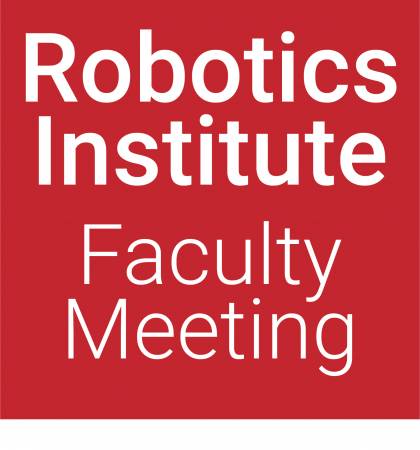Carnegie Mellon University
Towards Modular and Differentiable Autonomous Driving
Abstract: The classical "modular and cascaded" autonomy stack (object detection, tracking, trajectory prediction, then planning and control) has been widely used for interactive autonomous systems such as self-driving cars due to its interpretability and fast development cycle. In this thesis, we advocate the use of such a modular stack but improve its accuracy and robustness [...]
Carnegie Mellon University
Towards reconstructing non-rigidity from single camera
Abstract: In this proposal, we study how to infer 3D from images captured by a single camera, without assuming the target scenes / objects being static. The non-static setting makes our problem ill-posed and challenging to solve, but is vital in practical applications where target-of-interest is non-static. To solve ill-posed problems, the current trend in [...]
Carnegie Mellon University
Control Input and Natural Gaze for Goal Prediction in Shared Control
Abstract: Teleoperated systems are used widely in deployed robots today, for such tasks as space exploration, disaster recovery, or assisted manipulation. However, teleoperated systems are difficult to control, especially when performing high-dimensional, contact-rich tasks like manipulation. One approach to ease teleoperated manipulation is shared control; this strategy combines the user's direct control input with an [...]
Forecasting from LiDAR via Future Object Detection
Abstract: Object detection and forecasting are fundamental components of embodied perception. These two problems, however, are largely studied in isolation by the community. In this paper, we propose an end-to-end approach for detection and motion forecasting based on raw sensor measurement as opposed to ground truth tracks. Instead of predicting the current frame locations and [...]
Details to Follow . . .
Details to Follow . . .
Efficient 3D Representations: Algebraic Surfaces for Differentiable Rendering
Abstract: In this proposal, we show how some classic computer vision tasks can robustly be solved via optimization techniques by using an object representation that is compact and interpretable. Specifically, we explore the applications and benefits of representing 3D objects with an analytical, algebraic function by building an approximate, ray-based differentiable renderer. Our approximate formulation [...]
Carnegie Mellon University
Liquid Metal Actuators
Abstract: This thesis contributes to the field of soft actuators by introducing a generalized framework of actuators from liquid metals. The evolution of robotic actuators has enabled robots to achieve a diversity of motions. Like natural muscles, which converts chemical energy into mechanical work in response to electrical stimuli from the nervous system, actuators are [...]
Continual Robot Learning: Benchmarks and Modular Methods
Zoom Meeting Passcode: 841755 Abstract: The earliest reinforcement learning models were designed to learn one task, specified up-front. However, an agent operating freely in the real world will not in general be granted this luxury, as the demands placed on the agent may change as environments or goals change. We refer to this ever-shifting scenario [...]
Carnegie Mellon University
MSR Thesis Talk: Yash Oza
Title: Preprocessing-based Methods for Robotic Manipulation Abstract: Robotic manipulation is a key problem for several applications such as welding, pick-and-place, and automated assembly. However, motion planning for manipulation can be computationally expensive as it requires planning in the high-dimensional configuration space of the manipulator. Additionally, task-specific constraints such as strict time limits or constraints on end-effector [...]
Five Traps for Robots in Human Environments….And How to Avoid Them
Abstract: Robotics today is moving beyond fixed environments and into human spaces like homes, restaurants, and hospitals. In these new spaces, robots will necessarily have to interact with people. In some sense, every recent robotics problem is partly a human-robot interaction problem. Thus, the field of HRI can offer insights to the broader robotics community [...]
MSR Thesis Talk: Ingrid Navarro Anaya
Title: Socially-Aware Trajectory Prediction Guided by Motion Patterns Abstract: As intelligent robots across domains start collaborating with humans in shared environments, e.g., urban settings and terminal airspace, algorithms that enable them to reason over human motion and intent are important to enable seamless and safe interplay. In our work, we study human intent by focusing on the [...]
Carnegie Mellon University
MSR Thesis Talk: Qichen Fu
Date: Tuesday, July 19, 2022 Time: 9:00 AM - 10:00 AM ET Location: Newell-Simon Hall (NSH) 3305 Title: Detect Active Object in a Sequential Voting Process Abstract: A key component of understanding hand-object interactions is the ability to identify the active object -- the object that is being manipulated by the human hand. In order to accurately localize the [...]




